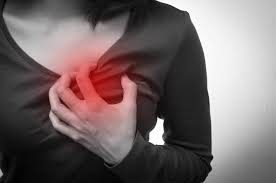Which is more dangerous: a panic attack or a heart attack?
The phrases “heart attack” and “panic attack” are often used synonymously in the context of medical emergency, which causes misunderstandings. Both illnesses have separate origins, symptoms, and possible outcomes, despite the fact that they both have the potential to induce uncomfortable symptoms. The purpose of this article is to clarify the distinctions between heart attacks and panic attacks, highlighting their unique traits and outlining the relative hazards of each.
The silent threat of heart attacks
Myocardial infarction, the medical term for a heart attack, is the result of an abrupt restriction of blood flow to a section of the heart muscle. This obstruction is often brought on by the development of a blood clot inside a coronary artery, which nourishes the heart with oxygen-rich blood. The cardiac muscle tissue may get damaged or even die if there is not enough blood flow.
Causes and Heart Attack Risk Factors
The buildup of fatty deposits, known as plaques, within the coronary arteries is the main cause of heart attacks. These plaques have the potential to rupture over time, resulting in the production of blood clots that impede blood flow. These plaques grow as a result of many risk factors, including:
Smoking: Smoking narrows the arteries and raises the risk of plaque development.
High Blood Pressure: High blood pressure damages the artery walls and encourages the growth of plaque.
High Cholesterol: Plaque deposition is influenced by elevated levels of LDL cholesterol, sometimes known as “bad” cholesterol.
Diabetes: Diabetes may damage blood vessels, putting people at a higher risk of developing plaque.
Obesity: Carrying around extra weight puts stress on the cardiovascular system and encourages the emergence of risk factors.
Family history: An individual’s vulnerability may be increased if there is a history of heart disease in the family.
Lack of Physical Activity: Sedentary lifestyles raise many heart disease risk factors.
Chronic stress: By influencing other risk factors, chronic stress may have an indirect influence on heart health.
The signs of a heart attack
The signs of a heart attack might vary, but frequent ones include:
Pain or discomfort in the chest that is often expressed as pressure, tightness, or aching.
Radiating Pain: The neck, jaw, back, or stomach may also be affected, generally the left arm.
Breathlessness: Having trouble breathing or feeling exhausted even while at rest.
Cold Sweat: Excessive sweating that often comes on top of nausea.
Lightheadedness or Dizziness: Experiencing faintness or dizziness.
Vomiting or nausea: This is possible, particularly in women.
Panic Attacks: The Chaos of the Mind
Contrarily, a panic attack is a brief but powerful bout of dread and discomfort that usually lasts a few minutes. While emotionally draining, panic episodes do not pose a life-threatening risk on their own.
Factors that Contribute to Panic Attacks
Although the precise etiology of panic attacks is unknown, it is believed that a mix of genetic susceptibility, brain chemistry, and environmental stresses is to blame. People who are vulnerable to panic attacks may experience certain triggers, such as:
Stressful Occurrences: Traumatic incidents, significant life transitions, or ongoing stress may all be factors.
Phobias: Particular phobias, such as claustrophobia or a fear of public speaking, might cause attacks.
Medical illnesses: Panic attack symptoms might be confused with those of illnesses like hyperthyroidism or certain heart disorders.
Substance Abuse: Excessive coffee, alcohol, or drug usage may start or exacerbate panic episodes.
A panic attack’s signs
An abrupt start of extreme dread and discomfort is a hallmark of panic attacks. Typical signs include:
a hammering or palpitating heartbeat; rapid heartbeat.
Sweating: Excessive perspiration that often comes with clammy, chilly hands.
Trembling or Shaking: Uncontrolled trembling or shaking.
Shortness of Breath: A feeling of suffocating or being out of breath.
Sharp or dull chest discomfort that is often misinterpreted for a heart attack.
Dizziness: Experiencing faintness or dizziness.
nausea: a sense of nausea or upset stomach.
An intense sensation of imminent disaster or loss of control.
Considering the Risks
It’s important to realize that heart attacks and panic attacks are fundamentally unlike in form and effects when comparing the two.
Threat of Heart Attack
If not addressed right once, heart attacks may be fatal and pose a serious risk to one’s health. Heart tissue may become permanently damaged or even die if blood supply to the heart muscle is cut off. To restore blood flow and reduce damage, quick medical intervention, often requiring techniques like angioplasty or stent implantation, is necessary. Serious consequences including heart failure or abnormal heart rhythms might arise from delaying therapy.
Attack in Panic Danger
While emotionally upsetting, panic attacks do not pose a danger to one’s life. They may, however, have an effect on a person’s quality of life and aid in the development of anxiety disorders or other mental health issues. Repeated panic attacks may cause people to engage in avoidance behaviors, which restrict their everyday experiences and activities by keeping them away from people or locations they connect with panic attacks.
In conclusion, heart attacks and panic attacks are two independent medical illnesses with unique origins, signs, and symptoms. Heart attacks are caused by plaque accumulation obstructing blood flow to the heart muscle, and they need immediate medical intervention. On the other hand, panic attacks are brief bouts of extreme dread and discomfort that are brought on by emotional and psychological issues but are not life-threatening. To guarantee the proper answers in the event of an emergency, it is crucial to understand the distinctions between these two circumstances. It’s critical to get medical help right away if someone exhibits signs of a heart attack, such chest discomfort. On the other hand, those who have panic attacks should concentrate on controlling their emotional discomfort and getting help from mental health experts to avoid the emergence of anxiety-related diseases.
In the end, both good heart health and mental wellness are crucial parts of good health. By being aware of the signs of both heart attacks and panic attacks, we can take preventative measures to live a healthy lifestyle and get the help we need when we do.







